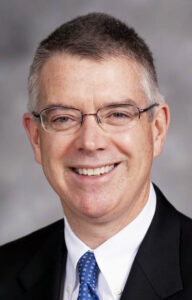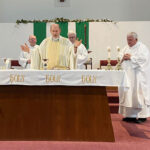By Tim Millea
The history of health care over the past two millennia parallels the evolution and expansion of Catholicism. Jesus’ miracles of healing in the Gospels reveal the supernatural and divine intervention for others, but his instructions to care for the sick have remained a foundational charge. Through the centuries, this admonition has been followed in caring for others regardless of their status in society, with equal dignity and attention to Christians and non-Christians, rich and poor.

In the first three centuries of the Catholic Church, communities of believers organized to provide care of the sick, orphans, widows, the unemployed and religious pilgrims. With the rise of Constantine, religious persecution ceased, and a significant expansion of these efforts was born. In the late fourth century, St. Basil the Great established “The Basiliad” in Caesarea, which became an early model for general hospitals. Others soon followed, including St. John Chrysostom’s hospital in Constantinople. The ongoing commitment, first and foremost, has remained the promotion and defense of the dignity and sacredness of every human life from conception to natural death.
The past several decades have witnessed erosions of that commitment, as well as increasingly vociferous attacks on Catholic health care entities that remain dedicated to Jesus’ original charge. The loud voices of secularism and moral relativism have insisted that Catholic health care providers either provide services that violate their conscience or simply stop operating. The support of Catholic leaders has been instrumental in combating this, including the U.S. Conference of Catholic Bishops’ (USCCB) release of the sixth edition of the “Ethical and Religious Directives for Health Care Services” (ERDs) earlier this year. Since the first edition published in 1948, this document has clearly outlined the principles, ethics and philosophy of Christ-centered health care.
The complexity and frustrations that accompany 21st century health care have prompted both providers and patients to seek better and more satisfying means to deliver care. Providers are frustrated with the impersonal experience of electronic medical care as well as the bureaucracy of insurance and administrative requirements. Patients are disappointed with rushed appointments and the lack of a trustworthy relationship with their provider. With these mutual complaints, there is a growing interest in primary care clinics that are “authentically Catholic.”
This initiative to establish Catholic and faith-centered clinics is widening rapidly from year to year. At the Catholic Medical Association’s Annual Conference in September, nearly 40 clinics from across the country attended a session focused on establishing a network of such clinics for mutual support and advice. These are a small segment of a much larger number of clinics that are committed to Catholic ERDs, which exclude prescription of contraceptives, sterilization procedures and recommendations or referrals for abortion. The combined experiences of these Catholic clinics have confirmed the value of this approach. The providers are fulfilled professionally, making statements that “I am finally practicing medicine the way it should be practiced” and the majority actively recruiting more faith-filled providers to help with the rapid growth in patient numbers. In turn, patients are once again happy with their relationship with their doctor and feel that “my doctor knows me and cares for and about me.” This re-establishment of the patient-physician relationship in its proper order exposes a deep and unfulfilled need in American health care today.
In response to this need, eastern Iowa and western Illinois will soon be able to benefit from the services of an authentically Catholic primary care clinic. Life and Family Educational Trust, which has operated the Women’s Choice Center in Bettendorf for 16 years, is now developing a faith-centered primary care clinic, with plans to open its doors in 2019. This clinic will be fully committed to following the ERDs, and will provide care to all, regardless of age, religion, gender or any other factor.
The clinic will function as a “direct primary care” (DPC) provider, which provides care to members who pay a monthly fee for primary care services. This allows immediate communication and access to care, without the burden of insurance filing, approvals for care or tests, co-pays and other frustrations for patients and providers. Also, in adhering to the call to care for the less fortunate, a portion of the members’ fee will provide care for the uninsured who are unable to obtain needed care elsewhere. From the provider to the patient, the Catholic principles of solidarity and subsidiarity are firmly followed.
The satisfaction of both patients and health care providers in America has been declining for many years. As has been true for centuries, the Catholic Church and its teachings have shown a way of enlightenment and improvement. With a return to proven and ethical practices, focused on Christ’s example, the future is bright.
(Dr. Millea is a physician, president of the St. Thomas Aquinas Guild of the Quad Cities and member of St. Paul the Apostle Parish, Davenport.)











